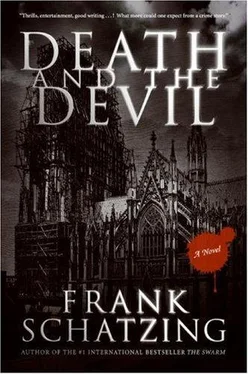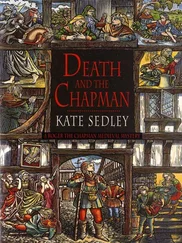Matthias glowered at him. He knew that among the extensive Overstolz clan he enjoyed the dubious reputation of being without feeling or pity. “That is irrelevant,” he said icily.
“No,” said Johann, sighing, “it’s never relevant, is it? We all know Daniel still hasn’t got over losing the office of magistrate. He was one of the youngest. I can reprimand him, but I can’t condemn him for the bitterness he feels.”
“Always the same old story.” Matthias gave a scornful snort. “Have you forgotten, we bought the post for Daniel. And wasn’t I a magistrate, too? Didn’t Conrad get rid of me in the same insulting way as he did Daniel? Do you see me in the ale houses, in low company, drinking like a fish, swearing, and molesting respectable women?”
Johann did not reply. He had no desire to pursue the subject any further. It had been the sole topic of conversation since the archbishop had relieved almost all the magistrates as well as one of the burgomasters of their posts the previous year. As a result, both Matthias and Daniel had had to accept that their political careers were finished. There were far fewer patricians in the new council, and those who were patricians had to work together with tradesmen and shopkeepers.
“I recently had the pleasure of reading what our friend Gottfried Hagen had to say about the archbishop’s new council,” said Johann, in an attempt to change the subject. “And though it be a sin, still I would hate the asses that have been put at the head of the holy city of Cologne. You can put an ass inside a lion’s skin, it will still bray like an ass. ”
Matthias gave a sour grin.
“And he goes on: They tax rich and poor more than ever and share their ill-gotten gains with the bishop. When they must pronounce judgment, they first ask the bishop what judgment would be acceptable to him, so they do not lose his favor. They are always guided by the wishes expressed by the bishop and nothing happens against his will. ”
“Gottfried’s right, of course, but if he goes on writing things like that, he’ll end up on the gallows. Bloody fools and arselickers! A magistrate who decides in favor of the noble houses exposes himself to the most vitriolic attacks.”
“It will all change,” said Johann confidently.
They had left the crowded marketplaces behind them. Once they were past the archbishop’s palace, behind which part of the new cathedral chancel could be seen, they would be able to get on more quickly.
“Certainly,” Matthias agreed, “everything will change. I just hope it changes in our favor, that’s all.”
“Why are you so concerned? We’ll find your redhead, don’t worry. Anyway, who’ll believe a beggar?”
“That’s what I said, too. But in the first place, Urquhart thinks there are certain people who would be quite happy to listen to the biggest scoundrel in the city, and in the second, I’m concerned about our alliance. I’m sorry that it has to be your son who causes me most concern. After Kuno, that is.”
Johann felt his heart sink.
“You know it yourself, Johann,” Matthias added.
Johann nodded gloomily. “Daniel will obey me. I promise.”
Matthias looked at him. Then he attempted a placatory smile. “Don’t misunderstand me, Johann. How you bring up your son is your own business. But we’re engaged in a hazardous venture. You and I see things clearly. Hatred hasn’t clouded our judgment. Heinrich is just a coward, I can live with that. But Daniel and Kuno have a tendency to extreme emotional outbursts and their dislike of each other is growing stronger by the hour.”
“I know.”
“We must keep the two of them apart as much as we can.”
“That will hardly be possible. Look.”
Matthias followed the direction Johann’s finger was pointing. They were in Marzellenstraße now, not far from Gerhard Morart’s large house. Old and young, rich and poor had come to pay their last respects to the architect. They included an array of patricians such as was seldom seen, expressing the general admiration for a man who wanted to build the perfect church and whom God, in His mercy, had taken up to the paradise he deserved.
Kuno was among them.
And coming down Marzellenstraße from the other side was Daniel, a self-satisfied smirk on his lips.
Trouble was not very far away.
Jacob was exhausted.
He stood at the window watching Richmodis take her unwilling father, complaining all the time and dragging his feet, back to their house. Goddert had been fired up by Jacob’s story. Horrified and outraged at what he had heard, he was all for setting off in pursuit of the demon at once, of informing the magistrates and constables, no, better the governor and the executioner or, no, why not go straight to the archbishop, who could summon a posse of clerics to crush the Devil beneath the weight of their prayers.
“We’re not going to crush anything today,” was all Jaspar had said.
“And why not?” snapped Goddert. “Are you too scared?”
“No, too sensible. You can pray till the roof falls on your head, I’m going to use mine.”
“Huh! You couldn’t even use your head for a tonsure! If this poor, oppressed soul here”—he pointed at Jacob with a dramatic gesture—“is being pursued by the Devil or one of his demons, then we must call on the Lord without delay, if not just for his sake, then for the sake of Gerhard Morart.”
“That is based on the assumption that the poor oppressed soul here is right. Who says it was the Devil? Or that Jacob is telling the truth? Were you there?”
“Were you there when they cut down poor Archbishop Engelbert? You still can’t deny he was murdered.”
“What I can’t deny is that you’re a stupid ass, Goddert. Gerhard Morart, God rest his soul, fell from a great height and broke every bone in his body, which does not prove conclusively it was the Devil. Engelbert’s body, on the other hand, had precisely forty-seven wounds—”
“More than three hundred it was!”
“—as Caesarius von Heisterbach wrote in his Vita, passio et miracula beati Engelberti Coloniensis Archiepiscopi . Wounds that he could hardly have inflicted on himself. And his murderer wasn’t the Devil, but Friedrich von Isenburg.”
“He was a devil!”
“He was Engelbert’s nephew, pea brain! I have to admit, though, that Engelbert wasn’t poor. He was a robber and bully, like our Conrad. It was not without reason that the pope excommunicated him.”
“That just shows your lack of respect toward your superiors in the Church. You’d also have to admit that Engelbert led the crusade against the Waldenses and Albigensians—”
“Because he liked fighting.”
“To do penance, you mudslinger!”
“Nonsense. He couldn’t tell the difference between a penance and a pig.”
“Better than you, he could!”
And so on and so on.
Like a herd of stampeding horses, the disputation was leaving the original topic farther and farther behind. Jacob’s brain was numb with exhaustion.
Richmodis stroked his hair. “Don’t let Jaspar fool you,” she said softly. “He argues for the fun of it, but when things get serious his mind’s as sharp as a razor.”
“I hope so.” Jacob sighed. “I can’t stand much more of that kind of conversation.”
She looked at him with a sympathetic, almost tender look in her eyes. Jacob felt a sudden fear she might go and he would never see her again.
“I’ll come and see you as soon as I can,” she said, as if she could read his thoughts. They were probably written all over his face.
“Do you believe me?” Jacob asked.
She thought for a moment. “Yes, I think I do.”
Читать дальше












